|
|
|
Sort Order |
|
|
|
Items / Page
|
|
|
|
|
|
|
| Srl | Item |
| 1 |
ID:
052314
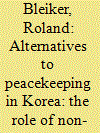

|
|
|
|
|
| Publication |
Spring 2004.
|
| Summary/Abstract |
Korea is one of the world's most volatile areas, not least because traditional UN mediation and peacekeeping missions are impossible. Having intervened in the Korean War on behalf of the southern side, the UN is a party to the conflict, rather than a neutral arbiter. The situation is particularly problematic because political interactions are characterized by a high degree of state-control over security policy. In both parts of the peninsula the state has, at least until recently, exercised the exclusive right to deal with the opponent on the other side of the hermetically divided peninsula. Given these domestic and international constrains, alternative approaches to conflict resolution are urgently needed. The recently proliferating literature on human security offers possible solutions, for it urges policy makers to view security beyond the conventional military-based defence of the state and its territory. Using such a conceptual framework, the essay assesses the potential significance non-state interactions between North and South, particularly those that promote communication, information exchange and face-to-face encounters. Even though these interactions remain limited, they are of crucial importance, for they provide an opportunity to reduce the stereotypical threat images that continue to fuel conflict on the peninsula.
|
|
|
|
|
|
|
|
|
|
|
|
|
|
|
|
| 2 |
ID:
134082
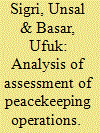

|
|
|
|
|
| Publication |
2014.
|
| Summary/Abstract |
This article proposes a model for assessment of peacekeeping operations. Peacekeeping operations began in 1948, under the authority of the United Nations in order to provide and sustain a peaceful environment throughout the world. International organizations such as the United Nations, the North Atlantic Treaty Organization and the African Union undertake peacekeeping operations in different geographical regions of the world. However, they lack some aspects of the assessment process. There were studies conducted previously in order to determine the principles of the assessment process of peacekeeping operations but none of them presented a comprehensive solution. Therefore, in this study, a clear, comprehensive and detailed assessment model was proposed, which may be applied in future peace operations and shed more light on the subject for future researches.
|
|
|
|
|
|
|
|
|
|
|
|
|
|
|
|
| 3 |
ID:
133937
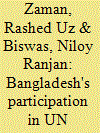

|
|
|
|
|
| Publication |
2014.
|
| Summary/Abstract |
This article argues that the participation of the Bangladeshi armed forces in UN peacekeeping has produced positive benefits for civil-military relations in the country and that this process is best explained by reference to concordance theory, as propagated by Rebecca Schiff. Unlike traditional theories of civil-military relations, concordance theory highlights dialogue, accommodation and shared values or objectives held by the military, the political elites and society. We argue in this paper that peacekeeping has gradually emerged in Bangladesh as an issue where all three partners are converging and prone to hold similar views. This may have a profound impact upon Bangladeshi politics whereby the chances of military intervention in domestic politics will lessen. This paper helps in understanding the implications of Bangladesh's involvement in UN peace missions, an issue on which little work has been conducted until now despite the fact that it has important implications for both the Bangladesh state and its armed forces.
|
|
|
|
|
|
|
|
|
|
|
|
|
|
|
|
| 4 |
ID:
099171
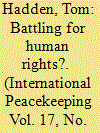

|
|
|
|
|
| Publication |
2010.
|
| Summary/Abstract |
The achievement of the objectives of international security, peacekeeping operations and peace enforcement, like the operations in Iraq and Afghanistan after the initial invasions, and of unilateral security operations, like those in Chechnya, Lebanon and Gaza, is often threatened by high levels of civilian casualties and physical destruction. Much of this is legitimized under the laws of armed conflict, notably the principles of legitimate military objectives and collateral damage, but would be contrary to human rights standards. This article argues that the claim that the laws of armed conflict and human rights are complementary is misleading and that international and national security, peacekeeping and peace-enforcement operations designed to protect and promote human rights should in principle be conducted under human rights standards. It explains how this could be achieved for international operations conducted under the auspices of United Nations Security Council Resolutions and/or status-of-forces agreements.
|
|
|
|
|
|
|
|
|
|
|
|
|
|
|
|
| 5 |
ID:
000941
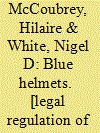

|
|
|
|
|
| Publication |
Aldershot, Ashgate, 1996.
|
| Description |
xx, 218p.
|
| Standard Number |
1855216264
|
|
|
|
|
|
|
|
|
|
|
|
Copies: C:1/I:0,R:0,Q:0
Circulation
| Accession# | Call# | Current Location | Status | Policy | Location |
| 040385 | 341.584/MCC 040385 | Main | On Shelf | General | |
|
|
|
|
| 6 |
ID:
111751
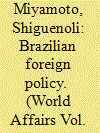

|
|
|
| 7 |
ID:
069584
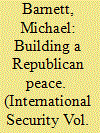

|
|
|
| 8 |
ID:
078815
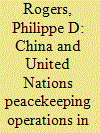

|
|
|
| 9 |
ID:
092710
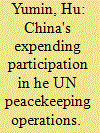

|
|
|
| 10 |
ID:
052316
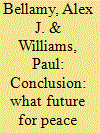

|
|
|
|
|
| Publication |
Spring 2004.
|
| Summary/Abstract |
This concluding essay discusses two contrasting agendas for future peace operations: the 'Brahimi agenda', the main elements of which resemble a problem-solving approach, and a 'critical agenda'. These agendas have different priorities but both contain important insights about how peace operations might be conducted more effectively. The essay begins by reflecting on the Brahimi agenda and suggests that some of its fundamental political insights have been sidelined during the implementation process. It then discusses one of the central challenges confronting peace operations, namely, how to deal with so-called 'spoilers'. We argue that while proposals for more privatized and regionalized peace operations may offer short-term palliatives in extreme circumstances, they suffer from several important limitations. The second section outlines how a critical agenda might contribute to making peace operations more effective in the short-term and making them redundant in the longer-term.
|
|
|
|
|
|
|
|
|
|
|
|
|
|
|
|
| 11 |
ID:
176223
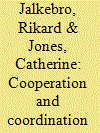

|
|
|
|
|
| Summary/Abstract |
East Asia (here consisting of China, Japan, North and South Korea, and the ten states of the ASEAN) is increasingly being considered as a region which is a potential crucible for conflict. Even the most optimistic authors recognise that there is the potential for security tensions to develop into more comprehensive kinetic actions. In the context of the growing trade tensions between China and the United States, which is drawing in other regional actors, the potential for economic interdependence to mitigate these tensions is reducing. Despite the context in this region we do, however, see evidence of cooperation and coordination emerging within the arena of (so-called) non-traditional security challenges. These papers explore different aspects of the cooperation that we see, and collectively they present the conditions under which there are positive cooperation outcomes in the areas of humanitarian assistance (HA) and disaster relief (DR) and/or peacekeeping operations (PKO). Collectively, they identify that mid-range theories have great explanatory power in exploring and researching this region.
|
|
|
|
|
|
|
|
|
|
|
|
|
|
|
|
| 12 |
ID:
052315
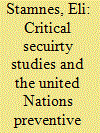

|
|
|
|
|
| Publication |
Spring 2004.
|
| Summary/Abstract |
This essay takes as it starting point that meta-theoretical assumptions affect our analyses of UN peace operations and have normative consequences. It demonstrates how this fact could be taken into account in such analyses by introducing an approach to the study of security - Critical Security Studies (CSS) - and by showing how the central ideas of this approach may be fitted into an alternative framework for analysis. This framework is based on the method of immanent critique and is in particular concerned with conceptions of security and human emancipation. An illustration of how this framework can be utilized to study the UN's preventive deployment in Macedonia is then provided. It is argued that some of this UN operation's activities can be regarded as contributions to a process of emancipation in Macedonia
|
|
|
|
|
|
|
|
|
|
|
|
|
|
|
|
| 13 |
ID:
095234
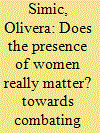

|
|
|
|
|
| Publication |
2010.
|
| Summary/Abstract |
Women are being encouraged to join peacekeeping operations as sexual violence problem-solving forces while simultaneously undertaking a complex role as 'protectors' of local women from local men and male peacekeepers. Since the adoption of Security Council resolution 1325 in 2000, the UN has urged states to deploy more women. Among the implicit assumptions underlying these calls are that an increase in the representation of women in peacekeeping operations (PKOs) will lead to a decrease in the cases of HIV/AIDS, a decline in the number of brothels around peacekeeping bases, and a reduction in the number of babies fathered and abandoned by peacekeepers after their mission comes to an end. Evidence suggests that the presence of women peacekeepers can and does foster a change in male behaviour when women are deployed in PKOs. This article argues, however, that countering abuse should not be a substitute for the more encompassing goal of improving gender balance and equality in PKOs. While there is a need to combat sexual violence in PKOs, the responsibility for prevention should be on troop-contributing countries, which need to exercise accountability and prosecute sexual violence committed by their peacekeepers. Diverting responsibility to women does not address the problem of sexual violence in PKOs, or help eradicate its causes.
|
|
|
|
|
|
|
|
|
|
|
|
|
|
|
|
| 14 |
ID:
190787
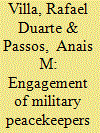

|
|
|
|
|
| Summary/Abstract |
Peacekeepers are seen as a UN tool for promoting domestic changes in host countries, but little is known about the political consequences when officers return home. During the last 10 years, Brazilian presidents appointed a significant number of former peacekeepers to key political functions. How and why do former peacekeepers end up so involved in government affairs? To answer this question, this paper focuses on the array of skills acquired by peacekeepers in domestic missions and reinforced abroad. Drawing on a set of semi-structured interviews and questionnaires to military, former political decision-makers, and researchers, as well as other primary and secondary sources, this paper details how political articulation, experience in conflict management, and prestige empowered Brazilian military officers to resume their tradition of intervention in politics. This paper also shows that peace operations can produce deleterious outcomes for troop-contributing countries in the Global South.
|
|
|
|
|
|
|
|
|
|
|
|
|
|
|
|
| 15 |
ID:
068175
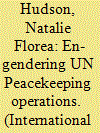

|
|
|
| 16 |
ID:
124518
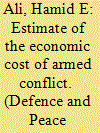

|
|
|
|
|
| Publication |
2013.
|
| Summary/Abstract |
There has been much debate in many forums to seek a settlement of the Darfur conflict (DC), but no study has addressed its economic cost. This study is the first attempt to quantify the economic cost of the DC. The war's costs include the destruction of infrastructure, direct military spending attributable to the war effort, and the impact of the latter on capital formation. In addition, the human destruction - loss of life and income - must be taken into account. Our calculations show that the government of Sudan has incurred costs totaling US$30.5 billion, equivalent to 171% of 2003 Gross Domestic Product GDP, on the war in Darfur. This includes $10.1 billion in direct military expenses; $7.2 billion in the lost productivity of internally displaces persons; $2.6 billion in foregone lifetime earnings of the dead; $4.1 billion in infrastructure damage; and $6.5 billion in war impacts on GDP. The total costs of the war are $41.5 billion if we added military spillover and African Union/UN hybrid operation in Darfur peace-keeping operations of $10.9 billion. While the country has spent only 1.3% of its budget on public health and less than 1% on education over the past two decades. The war consumes 13% of GDP in a society that lacks the means to provide the basic entitlements of education, food, health care, and shelter to its people.
|
|
|
|
|
|
|
|
|
|
|
|
|
|
|
|
| 17 |
ID:
185885
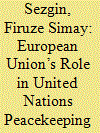

|
|
|
|
|
| Summary/Abstract |
The European Union (EU) repeatedly expresses its support to principles and values of the United Nations (UN), seeing the UN as the core of a rules-based global order. How does the EU perform in contributing personnel to UN peacekeeping operations, and what factors affect their personnel commitments? Recent work shows that the size of the deployed personnel matters for peacekeeping effectiveness, and personnel commitment is a crucial effort by the UN member states to prolong peace. This article’s contribution is to conduct the first analysis on the EU member states’ contribution rates on 53 UN peacekeeping operations throughout the last 30 years. By testing arguments of two general explanations for factors that affect peacekeeper contributions, the empirical findings reveal that although the EU members tend to contribute less to UN peacekeeping operations, they contribute significantly higher in the case of rising peacekeeper fatalities. However, the EU member states are less likely to contribute with humanitarian impulse or international security threat concerns. The findings suggest that no single theory can explain the contribution motives; instead, a wide range of interacting factors determine the decision to commit personnel to an operation.
|
|
|
|
|
|
|
|
|
|
|
|
|
|
|
|
| 18 |
ID:
134109
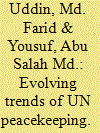

|
|
|
|
|
| Publication |
2014.
|
| Summary/Abstract |
Peacekeeping has emerged as one of the core activities of the United Nations (UN). Due to ground realities, the doctrines, principles and structures of peacekeeping have evolved in accordance with necessity. In the traditional phase, during the Cold War era, peacekeeping was mostly limited to monitoring and observation affairs. In the post-Cold War era, there was an expansion of peace operations and "minimum use of force", where necessary, emerged as an acceptable norm of peacekeeping. In the consolidation phase, after 2000, peace operations emphasised on peace building affairs i.e., democratisation, institution building, security sector reform (SSR) and human rights protection. The phase of New Horizon, which started in 2009 indicating changing trends, focuses mainly on development, capacity building, planning and oversight. It can be argued that the future peace operations are going to be more robust and multidimensional, and would concentrate on responsibility to protect civilians, human rights and environmental issues, gender mainstreaming, democratisation and institution building to achieve sustainable peace in the conflicting areas. Being a leading troops contributing country, Bangladesh will face new challenges to adapt with the emerging trends of UN peace operations. The challenges include dealing with new doctrinal issues and capacity building of its peacekeepers in the field level. In this respect, the main objectives of this paper are to understand the changing trends of UN peacekeeping and to identify potential challenges for Bangladesh and its likely responses in the coming days to continue its contributions in the UN peace operations.
|
|
|
|
|
|
|
|
|
|
|
|
|
|
|
|
| 19 |
ID:
137133
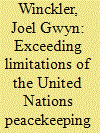

|
|
|
|
|
| Summary/Abstract |
United Nations peacekeeping is implemented by a complex bureaucratic organization, which itself can be a source of dysfunction and failure. This article empirically explores the strategies officials within the United Nations Mission in Liberia and the Department of Peacekeeping Operations apply in order to continue to do their job as effectively as possible despite the limitations of the UN peacekeeping bureaucracy. The findings demonstrate that internal acknowledgement and relevance of work are core strategic goals of UN officials. However, as the actual practices of achieving these objectives vary at different levels and locations of the UN peacekeeping bureaucracy, these strategies contribute to a significant diversity of local and decentralized decision-making frameworks rather than a rationalized effective bureaucracy.
|
|
|
|
|
|
|
|
|
|
|
|
|
|
|
|
| 20 |
ID:
167320
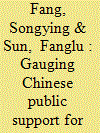

|
|
|
|
|
| Summary/Abstract |
In recent years, Beijing has significantly increased its support for UN peacekeeping operations (UNPKOs). Of the five permanent members of the Security Council, China is currently the largest troop-contributing country and the second-largest financial contributor to the UN peacekeeping budget. What is the view of the Chinese public on its country’s involvement in peacekeeping operations? We investigate the question using a public opinion survey experiment conducted in China. Our main findings are, first, that respondents showed a high level of support generally for China’s participation in peacekeeping operations but highest of all when China performed a leadership role. Secondly, China’s particular interest in a host country did not affect the degree of public support for China’s involvement; however, respondents did perceive broad benefits to China’s international reputation from such activities. Thirdly, although there was a similar level of support for China’s participation in peacekeeping whether the mission was authorised by the United Nations or by the African Union, neither was seen as a substitute for host state consent. Finally, respondents generally preferred China to make personnel (military and police) contributions in addition to financial contributions. These findings provide important insights into the domestic motivations for Beijing’s future peacekeeping policy and attendant constraints in this regard.
|
|
|
|
|
|
|
|
|
|
|
|
|
|
|
|
|
|
|
|
|